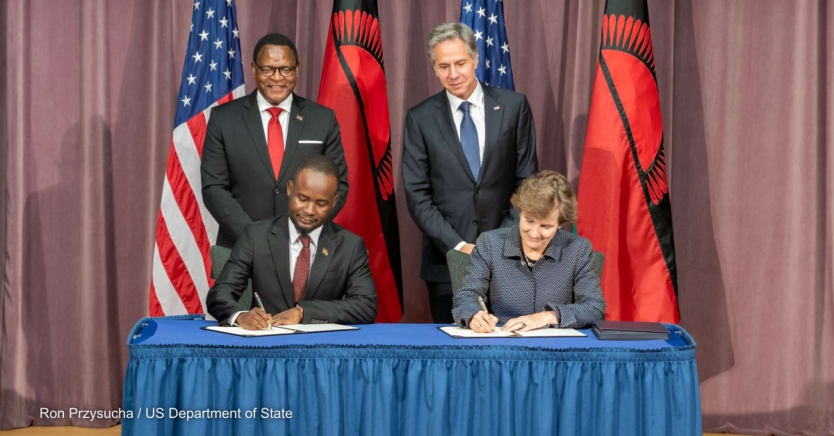Second Malawi MCC compact launched amid mixed results from the first

The power outages in Malawi are constant. Every day, electricity is rationed with some parts of the country experiencing eight-hour blackouts in the load shedding schedules. This is despite a $350.7 million investment the Millennium Challenge Corporation, or MCC, made in the energy sector through its first “compact” in the country.
The compact, or five-year co-designed grant agreement, ran between 2013 and 2018 and was designed to tackle what was identified as a key constraint to economic development in the country: electricity distribution, generation, and access. But some critics say that it didn’t fully achieve those objectives and are asking what could be done better as Malawi and the U.S. launch a new MCC compact.
In a ceremony at the U.S. State Department in Washington, D.C. last week, Malawi’s President Lazarus Chakwera and U.S. Secretary of State Antony Blinken officially signed a second compact. The Malawi Transport and Land Compact is a $350 million grant aimed at reducing transportation costs and improving the ability of farmers to get their products to market by upgrading 300 kilometers of roads.
“The MCC second compact for Malawi comes at a very opportune time, as it will augment my government’s effort to create a conducive environment for private sector growth, especially to benefit smallholder farmers in rural areas in Mzimba, Lilongwe, Mangochi,” Chakwera said.
He added that the compact had been stalled for some time due to corruption concerns, but his government’s efforts in the past couple of years to prioritize anti-corruption efforts had helped bring it to fruition. Blinken echoed the sentiments in his remarks, saying that the compact “will support Malawi’s development and its efforts to strengthen good governance, accountability, democracy — the hallmarks of the president’s administration.” These have also been key priorities for the Biden administration.
Blinken also emphasized that MCC and Malawi had developed the compact priorities together and that Malawi will take the lead in implementing the plans.
“Like all MCC endeavors, these projects will be transparent, they’ll be collaborative, and built to meet the highest standards of quality,” he said.
The first compact
The first compact consisted of three projects aimed at addressing the country's inadequate and unreliable power supply: the Infrastructure Development Project; the Power Sector Reform Project; and the Environmental and Natural Resource Management Project.
A total of $257.1 million — more than two-thirds of the compact — was invested in the Infrastructure Development Project to improve the reliability, stability, and quality of the power grid.
But critics argue that the compact did not meet those goals as the population of people connected to the electricity grid only rose by around 6% — from 9% before the project to 15% after the project — and power blackouts remain the order of the day.
Humphrey Mvula, a Malawian social commentator, said while the first compact has made tangible infrastructure development in the power transmission sector, its impacts are yet to be felt by the consumers.
From the archives:
MCC back in business in Malawi
The Millennium Challenge Corp.’s board of directors has decided to resume its $350 million compact with Malawi, almost a month after reopening its office there.
"The first compact was more about improving energy efficiency in the country, but while the project managed to increase by 6% people connected to the power grid, the regular electricity outages speak contrary to the project’s successes," Mvula said.
"The regular electricity outages means that as a country we are economically stagnating. People are losing out in business because of these regular electricity outages, in an ideal situation we should have reapplied for another energy sector financing to improve on where we left from the first compact," he added.
In 2009, Malawi had an installed electricity capacity of around 284 MW. The country now has an installed capacity of 362 MW. But demand for electricity was estimated to be 874 MW in 2020.
Dye Mawindo, CEO at Malawi Millennium Development Trust, told Devex that despite the current challenges, the first MCC compact investment was fruitful as it supported the construction of 400 kilometers of transmission and distribution lines and building of 26 new or refurbished substations, resulting in expanded access to reliable power throughout the country. Mawindo said the MCC funding enabled the government to increase the national grid’s electricity supply by 12 MW.
The compact also supported the restructuring of Malawi’s energy market, leading to the amendment of the country’s Electricity Act, which enabled private companies to generate electricity and the country to start importing electricity from regional suppliers.
Stephen Chiunjira, executive director at Our World International, a local nongovernmental organization that promotes environmental awareness, said the compact “revitalized the country's energy sector, giving room for the private sector to enter the electricity generation sector."
The MCC grid capacity also enabled Malawi to build power transmission substations that are designed to prepare Malawi to commence power trading with the Southern African Development Community through the Mozambique-led SADC power pool, Mawindo said.
Siyaphera Makunganya, founder of Energy and Environmental Center, added that the compact also engaged local communities in project activities thereby ensuring the sustainability of programs that were created under the program.
"The energy sector challenges we face in Malawi are a result of environmental degradation, by involving the local communities in environmental awareness programs, the first compact [promoted] community ownership of environmental programs," Makunganya said.
Lessons learned
Independent evaluations of the first compact found that there is a need to pursue realistic goals during project development as the power sector in many low- and middle-income countries will often exhibit a wide variety of interrelated challenges.
"There may be a tendency to attempt overly ambitious projects that work across multiple areas in an attempt to be holistic. However, it is important to be realistic—it is not plausible to fix everything in a sector in five years," reads the report. Tight project time frames during the first compact resulted in implementers working under very tough deadlines, according to the report.
Further, the evaluations found that given short time frames, it is tempting to press forward on many fronts simultaneously during the implementation of a project, resulting in overloading stakeholders and institutions, which may already be overburdened and not capable of managing the various contracts, issues, and interdependencies stemming therefrom.
Mawindo said during the first compact they were overwhelmed by the work during the project implementation due to failure to prioritize and unmanageable timelines. This challenge in the planning process affected the project in that workers were pushed to follow tight deadlines.
MCC eyes expansion of eligible countries to better tackle poverty
If a bill now in the U.S. Congress is passed, the Millennium Challenge Corporation could soon have a larger group of countries to work in. The legislation may help solve challenges for an agency hamstrung by a shrinking list of potential partners.
Based on the lessons learned from the previous contract, Mawindo said the Malawi Millennium Development Trust has carefully planned all activities to be undertaken in the new $350 million dollar compact which is expected to address the root causes of economic stagnation and increase competitiveness in the agriculture and transport sectors, and to increase land efficiency as a critical production input for economic growth.
Makunganya said that there was a need for wider consultations in future compacts so that the projects implemented would meet the development needs of the country.
A new compact
Road networks are one of the main focus areas of the new MCC compact, which include an Accelerated Growth Corridors Project that aims to address poorly maintained and constructed roads with civil works to improve the condition of farm-to-market roads in priority transport corridors.
Bad roads in Malawi have been identified as one of the causes of economic stagnation. Farm produce in hard-to-reach areas usually rots without even going to the market. Developing roads in hard-to-reach areas will help farmers gain market access, which would improve incomes of 80% of the country's population who are engaged in farming.
The compact will also work to increase land productivity by expanding revenues available to administer rural and urban land, clarifying rights to lease land and studying and supporting institutional reforms related to land rights.
"We are hoping that by the time the compact comes to an end we will have four main bitumen roads that will connect to gravel roads which will connect to the village roads. We are also hoping that district councils and cities will have working land administration systems," Mawindo said.
The project is expected to upgrade 300 kilometers of roads and as a result have a direct impact on the promotion of the country's agriculture sector and social service delivery at district and city levels, MCC Country Director for Malawi, Joel Wiegert said.
"It's difficult to have a compact on transport and land that cannot impact on civil works and agriculture, this compact will bring down transport costs so that farmers and big and small companies can easily transport their products," Wiegert said.
MCC will be working with the government of Malawi and various local entities including local councils to ensure that the roads are up to the standards and sustainable, he said, adding that MCC believes in government ownership of the projects.
"Indirectly we are trying to see more investments in the agriculture sector,” Wiegert said, adding that while the compact is not specifically looking at value chains it will facilitate agricultural investment.
He however warned that Malawians should not have expectations of seeing quick results as investing in a 300-kilometer road network involves a lot of planning in any part of the world. The compact will involve the construction of four new bitumen roads in selected primary agriculture zones as well as upgrading some of the roads to gravel standard, and new unpaved roads are also going to be created.
Malawi's Minister of Agriculture Lobin Lowe is optimistic that the signing of the new compact will ease the challenges that farmers face.
"Farmers have been making losses on their produce because they had many challenges transporting their produce to the market," he said in an interview with Devex.
Minister of Trade and Industry Mark Katsonga Phiri added that the new compact would spur rural industrialization.
"Small scale companies especially those dealing in agro-produce will find it convenient to operate their factories in the rural areas where raw materials are easily available," he said.
Search for articles
Most Read
- 1
- 2
- 3
- 4
- 5









